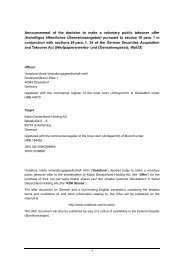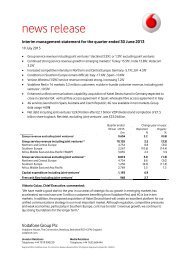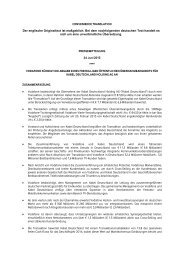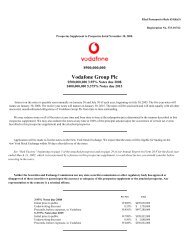Create successful ePaper yourself
Turn your PDF publications into a flip-book with our unique Google optimized e-Paper software.
Moving the debate forward • The Policy Paper Series • Number 8 • April 2008<br />
Jordi Gual<br />
Virtual private networks and<br />
the risk of price squeezes<br />
This report examines the economic nature of the pricing of<br />
virtual private networks (VPNs) commonly used by <strong>Vodafone</strong><br />
and other telecoms operators in the Spanish telephony<br />
industry. The price of some calls within VPNs is set below the<br />
price of call termination charged to third parties. It has been<br />
alleged that this practice may be detrimental to competition.<br />
The objective of this report is to assess whether that is the<br />
case in light of what economic analysis has to say with regard<br />
to competition in telephony markets.<br />
From the perspective of costs and technology,<br />
telecommunications operators are characterized by large<br />
fixed and sunk costs, related to the deployment of the<br />
network, very low variable costs and the presence of<br />
Chief Economist and Head of Research,<br />
“la Caixa”<br />
On-net Pricing in Mobile<br />
Jordi Gual is Professor of Economics at IESE Business School (University of Navarra). He is also Research<br />
Fellow of the Centre for Economic Policy Research (CEPR, London).<br />
During the Fall of 2000 he was Visiting Professor at the Economics Department of the University of<br />
California at Berkeley, and has been for several years the Head of the Economics Department and the<br />
Academic Director of the research centre “Public Sector-Private Sector” at IESE Business School.<br />
Between September 1994 and September 1996 he was Economic Adviser to the Director General for<br />
Economic and Financial Affairs of the European Commission in Brussels. In 1999 he won the European<br />
Investment Bank Prize for essays on European economic affairs.<br />
His most recent books are Integration of European Banking: The Way Forward, CEPR, London (2005);<br />
and Building a Dynamic Europe: The Key Policy Debates, Cambridge University Press, (2004).<br />
Other recently published work includes “Integrating regulated markets in Europe” in Subsidiarity and<br />
Economic Reform (forthcoming in Springer-Verlag); “Time to Rethink Merger Policy” in Competition Policy<br />
International (2007); “An Economic Approach to Article 82” in Competition Policy International (2006);<br />
“Vertical industrial policy in the EU: an empirical analysis of the effectiveness of state aid” in European<br />
Investment Bank Papers (2006); and “Telecommunications Policies: Measurement and Determinants” in<br />
Review of Network Economics (2006).<br />
common costs. The nature of costs leads to the appearance<br />
of non-linear pricing: price schedules such that prices decline<br />
(like average costs) with usage. Faced with competitive pressure,<br />
companies try to grab market share from competitors by<br />
capturing heavy-use consumers with price schemes that<br />
closely mimic the cost structure of the industry.<br />
From the demand side, telecommunications markets are<br />
characterized by network externalities that arise because<br />
the users of a network derive more benefits from its use the<br />
larger the network is. In the presence of competing networks,<br />
operators will have an interest in developing this externality<br />
effect, with the goal of “endogenously” generating a larger<br />
network, and are likely to offer subscription subsidies and low<br />
3

















